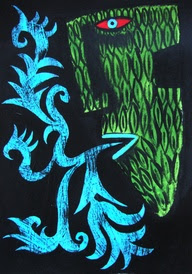I've been thinking a lot about how we need to support our culture and help it grow into what we want it to be. We have let big business and government shape our culture for too long. Here are a few simple ways we can vote with our dollars and time.
Caring for Image Culture
A while back, I wrote
an article about a solo show that a painter friend, Ashley Cooper, was having at the Earlville Opera House. I wrote about the need to support our local artists and galleries:
Ashley Norwood Cooper is an artist with a vocation, one that we locals ought to support with our attention and time and, yes, money. From now through May 14, pay a visit to her work at the Earlville Opera House, a model for arts programs in our area.
I happen to know that at least one person responded and supported both gallery and artist by purchasing a painting through the Opera House: that is, my husband read that article and acted on it! I don't know if anybody else did.
We don't have to be wealthy to support the arts in our area; a print or a painting by a young artist is often quite affordable. A modest original print or sketch already framed by the artist can be cheaper than the sort of framed posters people routinely buy at the mall.
Caring for Book Culture
Given the current "Big 6" demand for strict controls on e-book royalties, the push to "re-sell" e-books (strange, isn't it?), and the recent Supreme Court decision that foreign printers (okay, publishers--but they do none of the work of publishing) can sell (i.e. under-sell) their editions of books by American writers in the U. S. (books for which writers receive
no royalties), I suggest that those of you who love books and want book culture to continue do a simple thing. Decide how much you could budget each year to support books.
Caring for Youth Culture
I quite like
this article by Peter Brown Hoffmeister, a former "troubled youth" and now a high school teacher--an occupation in which he has a special awareness for kids who don't fit in. Many of the comments below the article disagree with some of his conclusions, but much that he says is impossible to argue against. I especially like his recipe for a life lived more out-of-doors for boys, and I salute his Mom for holding the line against videogame violence (if not against backpack guns.) He doesn't suggest that people volunteer with children and teens, but I think the thought is a natural outgrowth of the article.
A good many Cooperstown parents (including my scoutmaster husband) just came back from a trip to the Grand Canyon with Scouts, a trip the boys won't forget. Closer to home, they go on day hikes and local campouts; they camp year-round in the region and attend summer camp. As a result, they have a life that more closely resembles the sort of out-of-doors life and play all children used to enjoy (even though they're probably also addicted to videogames!) The well of the spirit fills up and is satisfied by images of the natural world, and bonds are created that persist through the school year, even creating some group loyalty for those who most don't fit in--the minority of Scouts with Asperger's/autism, dyslexia, ADD, and so on.
Caring for a Culture of courtesy
What has happened to us? The past week has seen the death of numerous public figures mocked and jeered online in public comments, often from anonymous voices. Sure, the thoughtful summation of a life is an important thing; we call it
reasoned assessment, criticism, or
history. But to dance and spit on the grave of the barely-cool dead is, I think, to act against that rare-in-the-universe substance: life.
We have moved from a culture where a mix of ideas about what to do about national political issues or what to think about religious issues has come to be seen as flat-out bad. Frankly, this will be creating a very poor world for the novelist, unless he or she happens to be, say, George Orwell. How do we accept that other people's ideas may have some value and points that we ourselves don't grasp? How do we show respect for the beliefs or solutions of others? We have forgotten how, it seems.
Love one another: it sounds so simple.

























